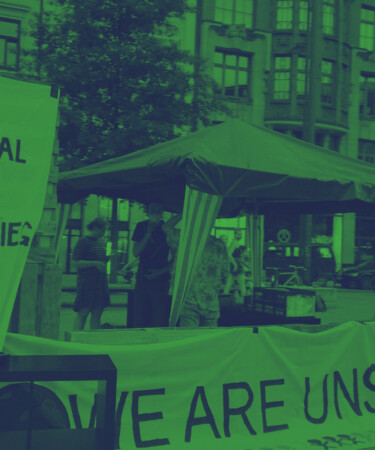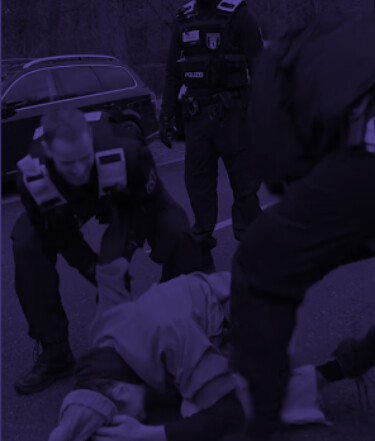
Project strengthening climate camps: For a strong freedom of assembly
Together with Fridays for Future we are going to court for the recognition of climate camps in the right of assembly.
Authorities and courts often deny climate camps the character of an assembly. Even the simplest infrastructure such as sanitary facilities, seating and protection from the weather are prohibited. Camps have to take place under such rudimentary conditions that long-term protest is simply no longer possible. Assembly authorities often prohibit protesters from sleeping or retiring to rest on site. Police often meticulously monitor compliance with strict regulations. Climate camps are monitored around the clock and sleeping activists are woken up. Violations of the regulations are increasingly prosecuted. This practice has an enormous deterrent effect on the demonstrators and leads to the fact that such an important form of protest as the climate camps are pushed out of the public space. Therefore, the GFF launches the project "Strengthening Climate Camps".
GFF project "Strengthening Climate Camps
With the project "Strengthening Climate Camps", the GFF advocates for the recognition of climate camps and a right of assembly that is open to future forms of protest. Through selected court cases we tie in with the previous case law of the Federal Constitutional Court and work towards ensuring that the right of self-determination of activists and the openness of the concept of assembly to new forms of protest, is once again in the foreground in official and judicial decisions.
Together with Fridays for Future, the GFF brought a case before the local administrative court against the ban of a climate camp in Dresden. In addition, the GFF is participating in appeal proceedings before the Federal Administrative Court on the side of a climate camp: in 2017, the state of North Rhine-Westphalia had partially banned the protest against the Garzweiler opencast coal mine.
FFF's climate camp in Dresden
In the proceedings concerning the Dresden Climate Camp, we support climate activists of a climate camp in the city center of Dresden. We are specifically opposing the city's conditions, which prohibited infrastructure (sleeping and workshop tents, tables/chairs) and the overnight stay at the meeting place. From the beginning, the organizers have stated that their goal is to demonstrate around the clock and without interruption under the motto "Climate Camp - we camp until you act".
This case makes clear how much the accessibility of a gathering is restricted when all participants are required to stand or expose themselves to any weather conditions without protection.
Climate camp at the open coal mine in Garzweiler
With this case, we argue that some overnight accommodation infrastructure is necessary for participation in a multi-day permanent assembly in a rural area. The climate camp in Garzweiler took place with several thousand participants in close proximity to the open coal mine. It consisted of an event area and two overnight accommodation areas. The Aachen assembly authority issued a decision stating that one of the overnight accommodation areas was not protected by Article 8 (1) of the German Basic Law.
The Higher Administrative Court of NRW ruled in the second instance that the Climate Camp 2017 as a whole, i.e. also the second overnight accommodation area, was subject to the protection of Article 8 (1) of the German Basic Law (OVG NRW, decision of June 16, 2020 - 15 A 3138/18). In the grounds for appeal, the city of Aachen now argues that there is no difference to a vacation camp, since the participants of the assembly could also have stayed in hotels and traveled to and from the protest camp by cab or stayed overnight in the event area itself. The proceedings before the Federal Administrative Court are led by lawyer Dr. Philipp Schulte on the side of the climate camp.
Freedom of assembly protects the self-determination of time, place and form of the protest.
Making climate camps virtually impossible is not compatible with the freedom of assembly under Article 8 (1) of the German Constitution. The Federal Constitutional Court has ruled that freedom of assembly protects the right of protesters to determine for themselves the time, place and form of the protest. The concept of assembly does not recognize a catalog of protected forms of assembly and is open to new forms of protest. The government must not judge the effectiveness of the chosen form. It can only take the necessary precautions and restrict protests if there is a concrete threat to public safety. In the case of the climate camps, the authorities basically assume that there is a danger. They argue that the camps are not protected as a whole by Article 8(1) of the Basic Law and that it is against the law of streets, roads or green spaces to exhibit tents.
There has not yet been a clear statement by the Federal Constitutional Court on protest camps. In summary proceedings on the "Anti-Capitalist Camp" in Hamburg's Stadtpark on the occasion of the G-20 summit in July 2017, the court had refrained from taking a clear position, referring to "difficult questions that have not been clarified in constitutional case law."
Climate camps and new forms of protest
The democratically self-determined understanding of freedom of assembly, which is always emphasized by federal constitutional law, argues for recognizing protest camps as legitimate and protected forms of freedom of assembly. This is because, according to the Federal Constitutional Court, even mere physical presence can be a means of protest. Hence, especially the permanent camping, where the protesters spend the night on site, must be understood as a special expression of protest and the seriousness of the activists.
Infrastructure is necessary for a longer lasting and uninterrupted stay at the place of protest. Furthermore, the camps as such are to be understood as a form of expression of the protest. Workshops, lectures or film screenings make the protest camps places of (education) and negotiation and enable a sense of community. The duration and openness reinforce the effectiveness of the camps: everyone is invited to join in and participate. The modeling of a climate-friendly and communal way of life, the constant development of new initiatives, and the diverse program increase media interest and opportunities to engage with the public.
The practice of the assembly authorities and the courts has not kept pace with this development of the culture of assembly. Yet this form of protest, especially because everyone can participate in a low-threshold way, is a prime example of the elements that are central to freedom of assembly according to the Federal Constitutional Court: "communal discussion" and "a piece of originally untamed direct democracy".
We are looking for plaintiffs!
For further strategic proceedings we are looking for plaintiffs to strengthen the freedom of assembly and the climate movement. If you are an organizer or participant of a climate camp and are affected by bans and disproportionate restrictions, please contact us at klimacamps@freiheitsrechte.org.
The project is supported by a grant of 25.000 EUR from Campact.



